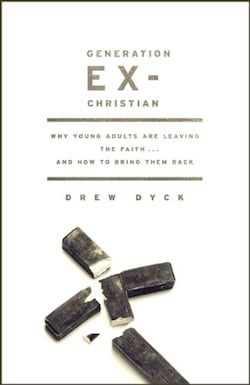The book Generation Ex-Christian by Drew Dyck (as summarized here by David Mays) depicts a scary future for anyone who cares about the Church in America.
Young people are dropping out of church at a rate five to six times the historic rate. And partly because adolescence is so much longer, d…
By Seth Barnes
 The book Generation Ex-Christian by Drew Dyck (as summarized here by David Mays) depicts a scary future for anyone who cares about the Church in America.
The book Generation Ex-Christian by Drew Dyck (as summarized here by David Mays) depicts a scary future for anyone who cares about the Church in America.
Young people are dropping out of church at a rate five to six times the historic rate. And partly because adolescence is so much longer, don’t expect them to come back like earlier generations.
Postmoderns process reality in a profoundly different way. How they feel in a particular moment trumps any previously made commitments. Nothing can be absolutely true for everyone. Experience is the key to finding truth. Rationality and logic don’t fit in their spiritual arena.
Broad proclamations of truth are seen as arrogant dangerous. Homosexuality is not about right and wrong but about dominance and oppression. When people believe something very strongly, they are apt to try to force that belief on others.
Postmodern thought believes a literary text can ultimately have no fixed meaning. This has moved from literature to life, so that there is a radical skepticism toward any truth external to oneself.
Postmoderns are also very concerned for the marginalized. Postmoderns often condemn the church for being insensitive in this area, even pointing back to the Crusades and the Inquisition. Moral relativism and a low view of truth are clearly irreconcilable with a biblical worldview.
Many have negative childhood experiences of pain and abuse. It is difficult for children to differentiate between their abusers and God. If abuse is not acknowledged or done in the name of God, it shakes the foundation of faith. And of course many other human failings sour people on faith. Many leave for emotional reasons and find intellectual reasons to support it. “Often disbelief is only a smoke screen, a reflex of recoilers to mask deep disillusionment and pain.”
Broad proclamations of truth are seen as arrogant dangerous. Homosexuality is not about right and wrong but about dominance and oppression. When people believe something very strongly, they are apt to try to force that belief on others.
Postmodern thought believes a literary text can ultimately have no fixed meaning. This has moved from literature to life, so that there is a radical skepticism toward any truth external to oneself.
Postmoderns are also very concerned for the marginalized. Postmoderns often condemn the church for being insensitive in this area, even pointing back to the Crusades and the Inquisition. Moral relativism and a low view of truth are clearly irreconcilable with a biblical worldview.
Many have negative childhood experiences of pain and abuse. It is difficult for children to differentiate between their abusers and God. If abuse is not acknowledged or done in the name of God, it shakes the foundation of faith. And of course many other human failings sour people on faith. Many leave for emotional reasons and find intellectual reasons to support it. “Often disbelief is only a smoke screen, a reflex of recoilers to mask deep disillusionment and pain.”
A key to reaching out is empathy, not arguments. What were their childhood experiences like? Have they encountered Christians who they saw as cruel hypocrites? Let them share their grievances but don’t put them on the defensive. Watch for emotional fervor indicating past suffering. Concentrate on learning their story. Empathize with their pain. Healing comes in the context of relationships. Earn trust. Help them make sense of their hurtful experiences, delineating between God and those who hurt them. And live a life of joyful faith.
They desperately need passionate storytellers who will re-enchant the
gospel story. Build trust. Invite them to serve. They are more likely to
discover truth through experience than reason.
gospel story. Build trust. Invite them to serve. They are more likely to
discover truth through experience than reason.
The young people most likely to remain faithful are those whose parents modeled a dynamic faith and those who established their own personal devotional lives.




experience has taught me the truth of these principles from both sides
Thanks Seth. I am not sure if you remembered that George Barna asked me for insights on his book REVOLUTION and actually appointed me as one of “twelve disciples” of the discussion. Get that book if you do not have it. It is the premable to all discussions on this topic.
Love to the Barnes….always……
getting. this. book. thank you Seth for sharing this!
As I “explore” faith with multiple women who are struggling with addiction, the gate into their heart is heavily defended. Their defenses up. Shame and guilt and anger and abandonment are just a few of the emotions they attach to God. You are so right on!knowing where someone has been by allowing them to unearth experiences one layer at a time builds trust. I walk along their path and join them in the mud (a place I am familiar with)until they are ready to consider another path. But I am pretty upfront with them along the way because part of trust is built with honesty. If they want to know me, they will at some point hear about Christ. I can’t separate him from my journey. He got me out of my mud pit and He will get them out of theirs. His timing not mine. Thanks for the blog!
Thanks Seth. I will checkout the book. Just this little bit explains why it is so hard to talk with my son, now 19 and his friends. I have no problem with people leaving “church” it is Jesus that they need. The mindset that keeps them from him concerns me.
Empathy and love are indeed the way to go. They are languages of the heart.
Wow. Astounding thoughts. I don’t think I will buy the book because it would probably make me even more frustrated at “postmoderns.”
I understand empathy. But our parents and grandparents would have told us to ‘suck it up’ and would have given us more chores to do. And that worked, didn’t it?
Maybe what we need is more strength and “tough love.” To me, postmoderns are crying out for discipline. When we approach them on the same terms everyone always has, aren’t we just telling them that the way they’re living is okay, because there’s always a convenient “excuse” ?
…I don’t know… I agree with your conclusions, we have to build trust, encourage them to serve, but take the focus off of them.
Thanks Seth. Another great conversation starter post…
SPOT ON!! And so painfully evident in our W. Michigan churched culture….I’m praying God will somehow use me to make a difference here.
Definitely getting this book. Thanks Seth
Christianity was a Roman Invention:
http://xdisciple.blogspot.com/2012/04/christianity-was-roman-invention.html
Tom Landry played the role of Pope John Paul:
http://xdisciple.blogspot.com/2012/06/football-as-religion-tom-landry-was.html